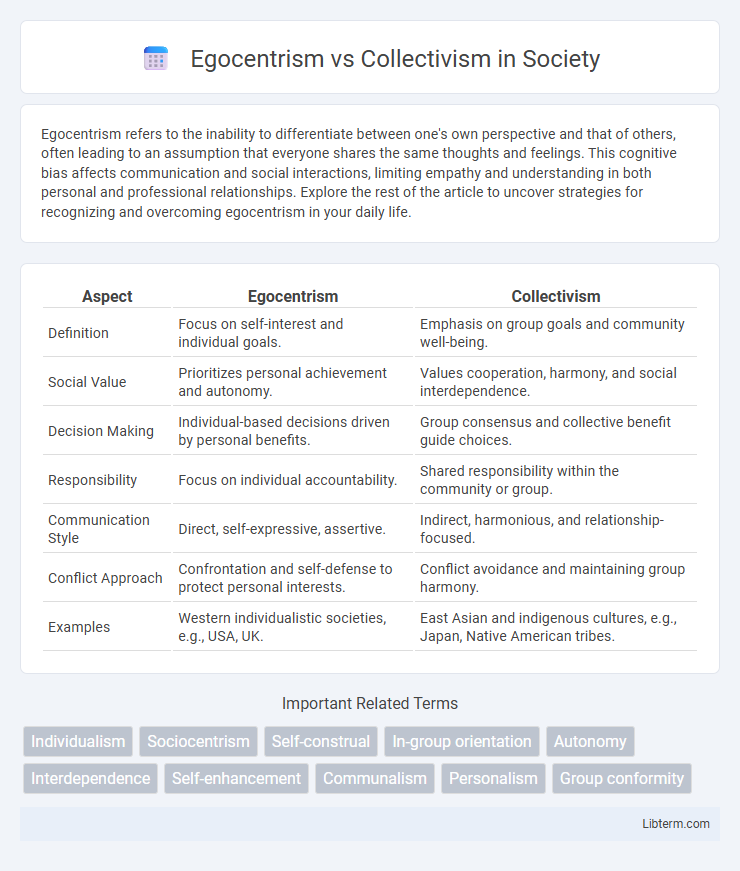Egocentrism refers to the inability to differentiate between one's own perspective and that of others, often leading to an assumption that everyone shares the same thoughts and feelings. This cognitive bias affects communication and social interactions, limiting empathy and understanding in both personal and professional relationships. Explore the rest of the article to uncover strategies for recognizing and overcoming egocentrism in your daily life.
Table of Comparison
| Aspect | Egocentrism | Collectivism |
|---|---|---|
| Definition | Focus on self-interest and individual goals. | Emphasis on group goals and community well-being. |
| Social Value | Prioritizes personal achievement and autonomy. | Values cooperation, harmony, and social interdependence. |
| Decision Making | Individual-based decisions driven by personal benefits. | Group consensus and collective benefit guide choices. |
| Responsibility | Focus on individual accountability. | Shared responsibility within the community or group. |
| Communication Style | Direct, self-expressive, assertive. | Indirect, harmonious, and relationship-focused. |
| Conflict Approach | Confrontation and self-defense to protect personal interests. | Conflict avoidance and maintaining group harmony. |
| Examples | Western individualistic societies, e.g., USA, UK. | East Asian and indigenous cultures, e.g., Japan, Native American tribes. |
Introduction to Egocentrism and Collectivism
Egocentrism centers on individual perspectives, emphasizing personal goals and self-interest as primary drivers of behavior. Collectivism prioritizes group goals, social harmony, and interconnectedness, valuing community well-being over individual desires. Understanding these contrasting cultural orientations reveals how personal identity and decision-making processes differ across societies.
Defining Egocentrism: Core Traits and Mindset
Egocentrism is characterized by a self-centered mindset where individuals prioritize their own perspectives and needs over those of others, often leading to difficulty in understanding different viewpoints. Core traits include a strong focus on personal goals, limited empathy, and challenges in social communication due to an inward-looking cognitive framework. This psychological orientation contrasts sharply with collectivism, which emphasizes group goals, social harmony, and interconnectedness.
Key Principles of Collectivism
Collectivism emphasizes the importance of group goals, social harmony, and interdependence over individual desires, promoting cooperation and shared responsibility within the community. The key principles include prioritizing collective well-being, valuing conformity and social cohesion, and encouraging individuals to align their actions with group norms and cultural traditions. This philosophy fosters strong social networks where mutual support and collaboration are essential for achieving common objectives.
Historical Context: Evolution of Both Concepts
Egocentrism and collectivism have evolved through distinct historical contexts, with egocentrism rooted in individualistic traditions seen prominently in Enlightenment-era Western societies that emphasized personal autonomy and self-interest. Collectivism emerged from communal values in ancient agrarian cultures and was further shaped by socialist and Confucian philosophies promoting group cohesion and social responsibility. The divergence of these concepts reflects broader socio-political developments influencing cultural attitudes toward identity and social organization worldwide.
Psychological Foundations of Egocentrism
Egocentrism in psychology is rooted in the cognitive development stages identified by Jean Piaget, where individuals, especially children, struggle to differentiate between their own perspective and that of others. This self-centered thinking limits the ability to understand or predict the mental states and emotions of others, influencing social interactions and decision-making. Contrastingly, collectivism emphasizes interdependence and prioritizes group harmony, often promoting cognitive frameworks that counteract egocentric biases.
Social and Cultural Roots of Collectivism
Collectivism finds its social and cultural roots in communal living, where group cohesion and interdependence are essential for survival and social harmony. Societies that emphasize collective values often originate from agrarian or extended family-based communities, which foster cooperation, shared responsibilities, and prioritization of group goals over individual desires. This cultural orientation promotes social norms that reinforce loyalty, conformity, and collective well-being, contrasting sharply with egocentrism's focus on individual autonomy and self-interest.
Impact on Interpersonal Relationships
Egocentrism prioritizes personal needs and perspectives, often leading to misunderstandings and conflicts in interpersonal relationships due to a lack of empathy for others' viewpoints. Collectivism emphasizes group harmony and interdependence, fostering cooperation and stronger social bonds through shared values and mutual support. The balance between these orientations significantly influences communication patterns, trust development, and conflict resolution within relationships.
Egocentrism vs Collectivism in Decision-Making
Egocentrism in decision-making emphasizes individual goals, personal benefits, and self-interest, often prioritizing one's own perspective over group consensus. Collectivism in decision-making values group harmony, shared goals, and collective well-being, encouraging collaboration and consensus to achieve common outcomes. Understanding the impact of egocentrism versus collectivism is crucial for optimizing leadership strategies, conflict resolution, and organizational effectiveness.
Societal Outcomes: Strengths and Weaknesses
Egocentrism promotes individual autonomy and personal achievement, often driving innovation and economic growth but can lead to social fragmentation and weakened community bonds. Collectivism enhances social cohesion and mutual support, fostering stability and shared well-being, though it may suppress individual freedom and slow decision-making processes. Balancing these cultural orientations shapes societal resilience, economic performance, and the overall quality of social relationships.
Navigating Balance: Integrating Both Perspectives
Navigating the balance between egocentrism and collectivism requires recognizing individual goals while valuing group cohesion, promoting a hybrid approach that optimizes personal autonomy and social responsibility. Psychological research indicates that integrating egocentric self-awareness with collectivist empathy enhances decision-making and conflict resolution in multicultural settings. Effective leadership models emphasize adaptive strategies that foster cooperative environments without suppressing individual creativity or self-interest.
Egocentrism Infographic

 libterm.com
libterm.com